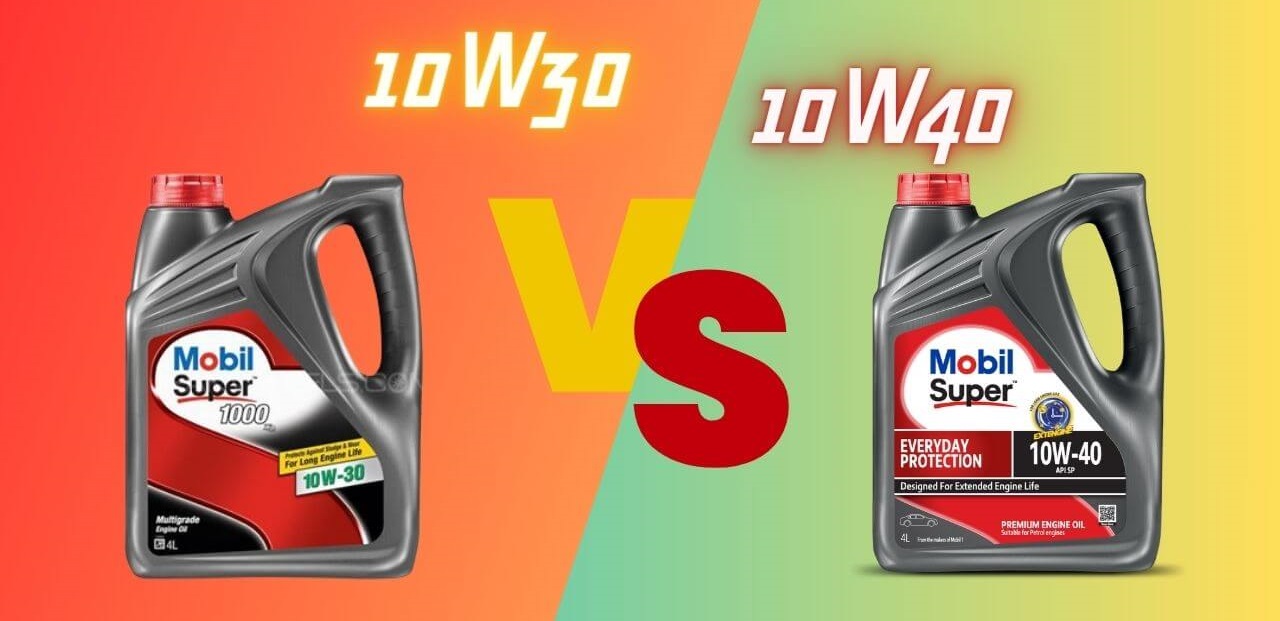Yes, you can mix 10W30 and 10W40 motor oils if necessary. It is generally safe to combine them for short-term use.
Motor oil is essential for the health and efficiency of your vehicle’s engine, serving as the lifeblood that keeps it running smoothly. The numbers in motor oil types, like 10W30 and 10W40, refer to viscosity ratings, which reflect the oil’s thickness and flow at different temperatures.
While mixing oils with different viscosities is not ideal, doing so temporarily won’t cause immediate damage. It’s important for drivers to understand that consistent use of the manufacturer-recommended oil grade is crucial for optimal engine performance and longevity. Emergencies might call for mixing oils, but for long-term maintenance, stick to a single viscosity grade to ensure your engine runs at peak efficiency.
Introduction To Mixing Oils
Car owners often wonder about mixing different motor oils. This practice raises questions about engine health and performance. Let’s dive into the world of oil viscosity and bust some common myths about mixing motor oils.
Why Oil Viscosity Matters
Oil viscosity refers to the thickness of the oil. It affects how well the oil can lubricate the engine. Engines require oil with a proper thickness to protect against wear and tear. Choosing the right viscosity is crucial for engine longevity.
- Thick oil protects at high temperatures
- Thin oil flows better in cold conditions
Mixing oils with different viscosities can change the overall thickness. This might affect engine protection.
Common Myths About Oil Mixing
Many believe that mixing different oils can damage the engine. Others think it’s a solution for performance. Let’s clarify these myths.
| Myth | Fact |
|---|---|
| Mixing oils harms the engine | In most cases, mixing similar type oils is safe. |
| Any oils can mix | It’s best to mix oils of similar viscosity and grade. |
Mixing 10W30 and 10W40 is often safe. But, it’s important to know the manufacturer’s recommendations. Always prioritize engine health over convenience.
Understanding 10w30 And 10w40 Oils
Understanding 10W30 and 10W40 Oils starts with their differences. Both are types of motor oils used in vehicles. They help engines run smoothly. Yet, they work best under different conditions. Let’s dive into what makes each oil type unique.
Viscosity Ratings Explained
Viscosity measures how thick or thin an oil is. This rating affects how oil flows in engines. Two numbers represent this in motor oils like 10W30 and 10W40.
- 10W – Shows how the oil flows at cold temperatures.
- 30 or 40 – Indicates oil flow at engine operating temperatures.
The lower the number, the thinner the oil. 10W30 is thinner at high temperatures than 10W40.
Ideal Use Cases For Each Oil Type
| Oil Type | Best Use |
|---|---|
| 10W30 | Light-duty vehicles, better fuel economy |
| 10W40 | High-performance engines, warmer climates |
10W30 oil is great for everyday cars. It helps save on gas. 10W40 oil works well in fast cars and hot places.
Potential Risks Of Mixing Different Viscosities
Potential Risks of Mixing Different Viscosities arise when vehicle owners consider combining 10W30 and 10W40 motor oils. These oils have distinct flow characteristics at various temperatures. Understanding the impact on engine performance and long-term health is vital.
Impact On Engine Performance
Mixing oils with different viscosities can lead to unpredictable engine behavior. The engine is designed for a specific oil grade. Changing this balance might affect performance.
- Oil pressure could become inconsistent.
- Lubrication might not be optimal.
- Engine wear can occur faster.
Performance issues may not show immediately. They can lead to costly repairs later on.
Long-term Engine Health Concerns
Long-term engine health relies on consistent lubrication. Mixing viscosities can disrupt this.
- It can cause sludge buildup.
- Oil passages might clog.
- Engine parts may wear unevenly.
Adhering to manufacturer recommendations is crucial. It ensures the longevity of the engine.
Mixing 10W30 and 10W40 is not advisable. Always consult the vehicle’s manual or a professional mechanic before making any changes to the oil type.

Credit: carstale.com
Expert Opinions On Oil Mixing
Expert opinions on oil mixing offer insights into best practices for car maintenance. Car owners often wonder about mixing different oil types, such as 10W30 and 10W40. Let’s look at what automotive experts and manufacturers say about this topic.
Automotive Professionals Weigh In
Many mechanics and auto technicians discuss the mixing of oils. They emphasize consistency in oil viscosity. A mix could affect engine performance. Some say emergency mixing is okay. They suggest a return to a single grade at the next oil change.
- Consistency is key for engine health.
- Mixing might be fine short-term.
- Return to recommended oil as soon as possible.
Manufacturer Recommendations
Car makers often provide clear guidelines on oil use. They usually discourage mixing different viscosities. They stress using the specific oil grade listed in the owner’s manual. This ensures long engine life and optimal performance.
- Follow the owner’s manual for oil specifications.
- Different oil types can lead to warranty issues.
- Stick to the manufacturer’s advice for best results.
Short-term Effects Of Mixing 10w30 And 10w40
Today, we talk about Short-Term Effects of Mixing 10W30 and 10W40.
Mixing these oils might worry some. Let’s explore what happens right away.
Immediate Engine Response
The engine feels the change quickly. Here’s what happens:
- Smoothness – The engine might run a bit smoother.
- Power – You may not notice big changes in power.
Oil Pressure And Temperature Changes
Oil pressure and temperature can change a bit. Let’s see how:
| Aspect | Effect |
|---|---|
| Oil Pressure | It might increase slightly. |
| Temperature | Changes are minimal. |
Overall, mixing 10W30 and 10W40 for a short time is okay.
The engine will still work fine. Always check your car’s manual first.

Credit: m.youtube.com
Long-term Consequences For Your Engine
Understanding the long-term effects of mixing oils is crucial. Your engine relies on the right oil to function smoothly.
Wear And Tear Over Time
Mixing 10W30 and 10W40 oils might seem harmless. Over time, this mix can accelerate engine wear. Different oil viscosities blend unevenly. This can create unpredictable oil properties. Engine parts need consistent lubrication. Varying oil thickness can lead to increased friction. This can cause parts to wear down faster.
- Inconsistent viscosity can harm engine components
- Friction and heat build-up can degrade engine parts
- Increased wear leads to more frequent repairs
Influence On Oil Change Intervals
Mixed oils may break down at different rates. This can affect how often you need an oil change. Regular oil changes keep engines healthy. With mixed oils, you might need changes more often. This means more time and money spent on maintenance.
| Mixed Oil | Change Interval | Cost Over Time |
|---|---|---|
| 10W30 + 10W40 | Shortened | Increased |
Shorter intervals can lead to:
- More frequent service appointments
- Higher long-term maintenance costs
- Potential for engine stress
Best Practices For Motor Oil Use
Understanding best practices for motor oil use is key to vehicle health. Motor oil keeps engines running smoothly. It reduces friction and wear. It also helps in cooling engine components. But choosing the right oil can be tricky. Mixing different oils raises questions. Let’s dive into these best practices.
Choosing The Right Oil For Your Car
The right oil protects your engine. It ensures peak performance. Always check your vehicle’s manual. It lists the recommended oil type. Follow the manufacturer’s guidance. This choice depends on many factors. These include engine design and your driving conditions.
- Consult your car’s manual for oil recommendations.
- Consider the climate you drive in. Temperature affects oil performance.
- Look at your driving habits. Frequent short trips may require different oil compared to long highway drives.
- Pay attention to oil grades. They indicate oil thickness and flow at certain temperatures.
When To Stick With A Single Viscosity
Single viscosity oils have consistent thickness. They work well in specific temperature ranges. Multi-viscosity oils adapt to temperature changes. Using the correct viscosity is crucial. Stick to one type for the best results.
| Temperature | Recommended Viscosity |
|---|---|
| Cold Climates | Lower Viscosity (e.g., 10W30) |
| Warm Climates | Higher Viscosity (e.g., 10W40) |
Do not mix different viscosities without expert advice. It can reduce oil efficiency. It can lead to engine damage. Stick to the oil your car knows and loves for a smooth ride.
Alternatives To Mixing
Car owners often ask about mixing different oil grades. It’s key to know viable alternatives. Here are some safe options instead of mixing 10W30 and 10W40 oils.
Using Multi-grade Oils
Multi-grade oils are your best bet. They work in various temperatures. These oils flow well in cold and protect engines at high heat. They have two viscosity grades. For instance, a 10W-40 oil can perform like a 10-weight oil when cold. Yet, it protects like a 40-weight oil when hot. This flexibility means no need to mix different oils.
- Convenience: Single product for all temperatures.
- Protection: Suitable for both cold starts and high-temperature operation.
- Economy: No need to buy multiple oil types.
Seeking Professional Advice For Oil Changes
Always consult a mechanic for oil changes. They provide expert guidance. Their knowledge can prevent engine damage. Mechanics will suggest the best oil for your car. They consider the manufacturer’s recommendation and driving conditions.
| Advantage | Why It’s Important |
|---|---|
| Expert Insight | Prevents wrong oil mix. |
| Customized Recommendation | Matches your car’s needs. |
| Long-Term Health | Keeps engine running smoothly. |
Faqs On Engine Oil Mixes
Understanding the specifics of engine oil can be tricky. ‘FAQs on Engine Oil Mixes’ aims to simplify this. It covers common questions about mixing different oils. Let’s dive into the top concerns car owners have.
Top Questions From Car Owners
- Is mixing 10W30 and 10W40 oil safe?
- What happens when different oils blend?
- Does oil mix affect engine performance?
- Can mixed oils damage the engine?
Clearing Up Common Confusions
Mixing oils is not recommended. But sometimes, you may need to. Here’s why:
| Concern | Explanation |
|---|---|
| Viscosity | 10W30 is thinner than 10W40. |
| Climate | 10W40 works better in hotter conditions. |
| Engine Wear | Mixed oils may not protect well. |
| Performance | Mixing may lead to suboptimal performance. |
Mix oils only as a last resort. Always try to use the manufacturer’s recommended oil type.

Credit: m.youtube.com
Conclusion: Making An Informed Decision
Mixing 10W30 and 10W40 oils: good or bad? Let’s decide.
Summary Of Insights
- 10W30 and 10W40 are motor oils.
- They work in engines to keep them running smoothly.
- Mixing them is possible but not always ideal.
- Both oils have different thickness levels at high temperatures.
- This difference can affect engine performance.
Final Recommendations For Motorists
Before mixing oils, know these tips:
- Check your vehicle’s manual. It guides you best.
- If unsure, ask a professional mechanic.
- Mixing can be a temporary solution only.
- Always aim for consistent oil types during changes.
- Monitor your engine’s performance closely after mixing.
Choosing the right oil keeps your engine healthy. Be wise!
Frequently Asked Questions
Can Mixing 10w30 And 10w40 Damage My Engine?
No direct damage should occur, but mixing can dilute the oil’s performance characteristics, potentially affecting engine protection.
What Happens When 10w30 Mixes With 10w40?
Mixing these oils changes the viscosity, potentially leading to suboptimal lubrication and increased engine wear over time.
Is It Safe To Combine Different Oil Viscosities?
While not ideal, combining oil viscosities in a pinch won’t cause immediate harm, but it’s best to use the manufacturer’s recommended oil.
Does Mixing Oils Affect Engine Performance?
Mixing oils can lead to inconsistent viscosity, which may compromise the oil’s efficiency and the engine’s performance.
Can I Top Off My 10w30 With 10w40?
Yes, you can top off with 10W40 if 10W30 isn’t available, but it’s preferable to stick with the same viscosity for consistent engine performance.
Conclusion
Mixing 10W30 and 10W40 oils can be a temporary solution, but it’s not ideal for long-term engine health. Opting for a consistent oil type ensures better performance and longevity for your vehicle. Always consult your car’s manual or a professional for the best advice tailored to your engine’s needs.
Stay informed, stay safe.

















